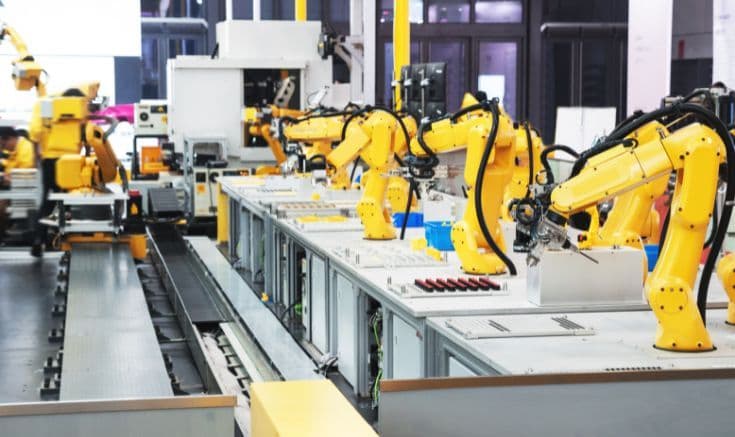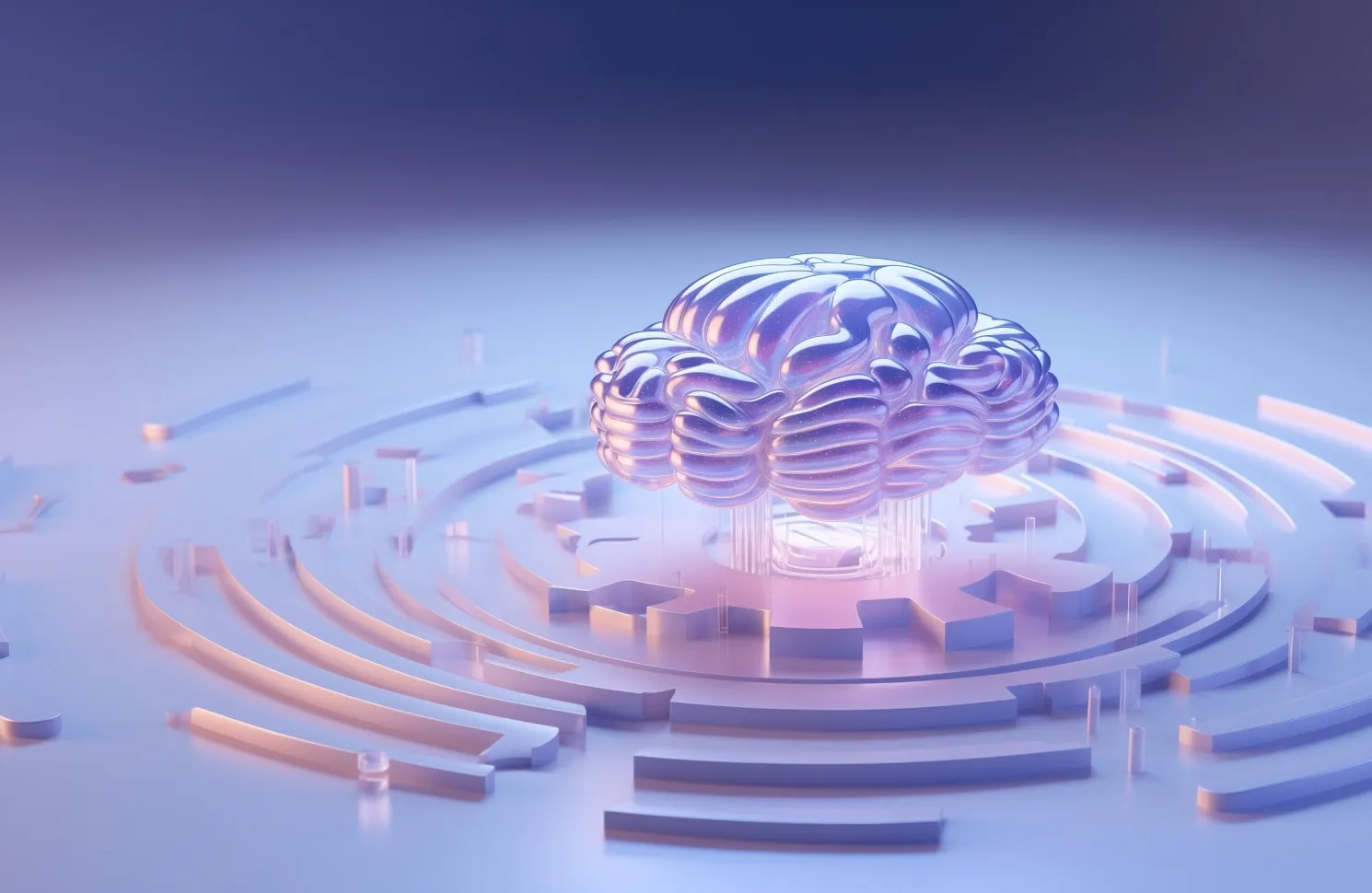

How AI is impacting society and shaping the future
AUG. 22, 2024
11 Min Read
The impact of AI is undeniable. Artificial intelligence (AI) has rapidly shifted from a futuristic concept to a critical tool that shapes industries, jobs, and daily life.
Today, AI plays an essential role in improving business operations, enhancing customer experiences, and even driving social change. As AI evolves, its effects will only become more pronounced, fundamentally altering the fabric of society and the future of work.
AI is transforming society and shaping the future by influencing industries, the workforce, and social infrastructure. Its increasing integration into the global economy brings both challenges and opportunities for businesses.
Key takeways
- 1. AI is transforming multiple industries, including healthcare, finance, retail, and manufacturing, by improving operational efficiency, enhancing customer experiences, and driving innovation.
- 2. Over the next decade, AI will significantly impact new sectors like energy, transportation, and agriculture, offering automation and efficiency improvements across various industries.
- 3. AI is reshaping the job market by automating routine tasks while enhancing roles in data science, healthcare, software development, and more, but it also necessitates workforce adaptation.
- 4. The ethical challenges of AI include concerns around bias, privacy, transparency, and accountability, making responsible AI adoption essential to avoid unintended negative impacts.
- 5. Businesses that embrace AI for real-time data insights, personalization, and healthcare advancements will experience enhanced decision-making, customer engagement, and operational success.
AI's impact on businesses
Artificial intelligence is reshaping the global business landscape, offering companies powerful tools to streamline operations, reduce costs, and improve decision-making. Its applications are transforming industries from healthcare and finance to retail and manufacturing. By leveraging AI technologies, businesses can automate repetitive tasks, gain deeper insights from data, and deliver personalized customer experiences at scale, all while increasing efficiency and profitability.
The impact of AI is not confined to a few select sectors—its reach is expansive, influencing industries across the board. Healthcare providers are using AI to improve patient outcomes through predictive analytics and AI-assisted surgeries, while financial institutions are leveraging AI for fraud detection and automated trading. Meanwhile, retailers are enhancing customer experiences with AI-powered recommendations and chatbots. The next decade will likely see AI integrated into nearly every aspect of business operations, revolutionizing how companies compete and innovate in an increasingly digital world.
"AI presents both vast opportunities and formidable challenges for the future. Organizations that focus on ethical AI development, data privacy, and workforce transformation will lead the way in leveraging AI for long-term success."
Industries being transformed by AI
Healthcare: AI transforming patient care
AI has revolutionized the healthcare industry by enhancing patient diagnosis, predictive analytics, and personalized treatment. AI-powered tools such as diagnostic imaging systems and predictive models can identify health risks with unprecedented accuracy, helping doctors make more informed decisions. AI is also driving the development of AI-assisted surgeries, where robots assist in highly precise and minimally invasive procedures, improving patient outcomes and reducing recovery times. Beyond clinical applications, AI-powered chatbots are increasingly used to provide patient support and information, answering common medical questions and scheduling appointments, thus easing the burden on healthcare staff and reducing costs.
As AI continues to evolve, it is anticipated that it will play an even more significant role in medical research and drug discovery, accelerating the development of new treatments and personalized medicine approaches that are tailored to individual genetic profiles.

AI is not only saving lives through improved medical interventions but also reducing healthcare costs, transforming the way the healthcare industry operates from patient care to research.
Finance: AI enhancing fraud detection and risk management
The financial services industry has been quick to adopt AI, where its ability to analyze vast datasets in real time is crucial for detecting fraudulent activities and improving risk management. AI-powered algorithms help financial institutions identify suspicious transactions, flag potential fraud, and protect customers from cyberattacks. By automating fraud detection, financial services firms can reduce human error and prevent costly breaches.
AI is also making waves in automated trading, where algorithms can make faster and more informed decisions based on real-time market data. AI tools enhance risk management by analyzing patterns in financial data that humans may miss, providing more accurate assessments of market conditions and customer creditworthiness.
As AI continues to develop, its ability to process vast amounts of financial data in real time is helping the finance sector become more secure, efficient, and profitable.
Retail: AI transforming the customer experience
The retail industry is leveraging AI to reshape the customer experience by offering personalized product recommendations based on consumer behavior and preferences. AI tools analyze data from previous purchases, browsing habits, and customer reviews to predict what products or services a customer is most likely to be interested in. This hyper-personalization not only boosts customer satisfaction but also increases sales and customer loyalty.
Additionally, AI plays a key role in inventory management. Predictive analytics can forecast demand, ensuring that retailers stock the right products at the right time, minimizing stockouts and overstocking. Retailers are also increasingly using AI chatbots to handle customer service inquiries, offering 24/7 support and freeing up human agents to handle more complex issues.

By improving customer engagement, streamlining inventory management, and offering personalized experiences, AI is helping retailers meet customer expectations and improve operational efficiency.
Manufacturing: AI-powered efficiency and cost reduction
AI is transforming the manufacturing industry by enabling predictive maintenance and the use of AI-powered robots. Predictive maintenance systems use AI to monitor machinery and predict when maintenance is needed, preventing costly breakdowns and minimizing downtime. This allows manufacturers to reduce operational costs while increasing productivity.
In addition to maintenance, AI-powered robots are being deployed on assembly lines, performing repetitive tasks with precision and speed. These robots work alongside human workers, improving overall production efficiency and freeing up employees to focus on more strategic tasks. AI also enables manufacturers to optimize their supply chains by forecasting demand and adjusting production schedules in real time, reducing waste and maximizing resource allocation.
AI’s integration into manufacturing has significantly enhanced productivity and cost efficiency, enabling manufacturers to optimize operations and reduce waste.

What businesses might AI impact over the next decade?
As AI continues to develop, the next decade will likely see even more profound changes across a variety of industries. Beyond traditional sectors, AI is set to reshape businesses in energy, transportation, and agriculture, among others:
- Energy: AI will optimize energy usage and drive the shift toward renewable sources. For example, AI systems can manage the demand for electricity by predicting consumption patterns and balancing the grid more effectively, paving the way for sustainable energy solutions.
- Transportation: Autonomous vehicles and AI-enhanced logistics will revolutionize the way goods and people move across the globe. AI will optimize delivery routes, reduce fuel consumption, and create smarter traffic management systems that improve urban mobility.
- Agriculture: AI-powered precision farming will help optimize crop yields and manage environmental impacts, supporting sustainable agriculture. AI systems will monitor soil health, weather patterns, and crop growth to improve efficiency and reduce resource waste.
- Real estate: AI-powered analytics will enhance real estate investments by predicting market trends, assessing property values, and managing tenant relationships. Real estate companies will use AI to analyze massive datasets, improving decision-making and reducing risks.
- Telecommunications: AI will drive innovation in the telecommunications industry by optimizing network performance, improving customer service through chatbots, and analyzing large volumes of data for better service delivery.
- Education: AI-powered platforms will revolutionize education by offering personalized learning experiences, automating administrative tasks, and providing students with AI-driven tutors that adapt to their learning style and pace.
Businesses across all sectors will experience major benefits and challenges from AI’s rapid development. By embracing AI, companies can position themselves at the forefront of innovation, ensuring they remain competitive in a fast-evolving landscape.
As AI continues to reshape various industries, businesses that prioritize AI adoption and integration will be well-positioned to thrive in the coming decade.
Impact of AI on jobs
One of the most discussed impacts of AI is its effect on the workforce. AI is automating repetitive and time-consuming tasks, which is transforming job roles across industries. However, this transformation also raises concerns about the future of employment.
What jobs will AI replace?
AI is particularly effective at automating tasks that are repetitive, data-driven, or predictable. Jobs at high risk of automation include:
- Data entry and processing: AI can handle large datasets far more efficiently than humans, reducing the need for manual data entry roles.
- Manufacturing roles: Assembly line jobs that involve repetitive tasks are being replaced by AI-powered robots.
- Customer service: AI chatbots and virtual assistants are increasingly handling customer inquiries, reducing the need for traditional call center roles.
- Telemarketing: AI-powered voice recognition systems can conduct scripted sales calls, reducing the need for human telemarketers.
- Accounting clerks: Basic bookkeeping and invoice management tasks are being automated by AI-driven accounting software.
- Retail cashiers: AI-driven self-checkout systems are replacing cashiers in retail stores, speeding up the payment process and reducing staffing needs.
- Logistics coordination: AI systems are managing supply chain tasks like tracking and routing, decreasing the need for manual logistics coordinators.
As AI automates these repetitive and process-driven roles, businesses can focus on reassigning human workers to more strategic, creative, and complex tasks.
"AI is transforming society and shaping the future by influencing industries, the workforce, and social infrastructure."
Jobs AI will enhance, not replace
While some jobs will be replaced by AI, many others will be augmented by AI technologies. AI will enhance roles such as:
- Data scientists and analysts: AI helps process and interpret vast amounts of data, but human expertise is still essential for strategic decision-making.
- Healthcare professionals: AI assists with diagnostics and treatment planning, allowing healthcare professionals to focus more on patient care.
- Creative professionals: AI tools are being used to assist in content creation, but human creativity and direction remain invaluable.
- Software developers: AI-powered tools can automate code generation, bug fixes, and testing, but human developers are still required to design, guide, and oversee complex software projects.
- Teachers and educators: AI-powered learning platforms can assist with grading, personalized learning plans, and lesson development, but educators play an irreplaceable role in fostering student engagement and critical thinking.
- Marketing professionals: AI-driven analytics enhance marketing strategies through predictive analysis and personalization, but marketers remain crucial for creating brand narratives and human-centered campaigns.
- Legal professionals: AI helps analyze legal documents and case law, but attorneys are still needed for negotiation, courtroom advocacy, and strategic legal counsel.
AI is enhancing these roles by automating routine aspects of the work, freeing up professionals to focus on more value-added, creative, and strategic elements.
Social and ethical impacts of AI
As AI becomes more integrated into society, its impact extends beyond the economy and workforce. AI systems increasingly influence social structures, ethics, and decision-making processes. This transformation requires careful consideration of both positive and negative consequences.
How has AI impacted society?
AI technologies are reshaping how people interact with the world in several significant ways:
- Social media: AI algorithms control the content users see on platforms like Facebook, Instagram, and TikTok, shaping how information is consumed and shared. These algorithms can amplify certain viewpoints or misinformation, affecting public discourse and societal dynamics.
- Public safety: AI is used in predictive policing and surveillance systems, raising concerns about privacy, ethics, and civil rights. While AI can help reduce crime, there are worries about its role in over-policing and discrimination.
- Healthcare: AI-powered diagnostic tools are improving healthcare outcomes, but questions about data privacy and algorithmic bias remain pressing concerns. AI has the potential to improve patient outcomes by offering more accurate diagnoses, yet it requires large amounts of sensitive data, raising issues about consent and privacy.
- Employment: AI has impacted employment by automating jobs, altering the nature of work, and creating new roles that require more advanced skills. This shift is causing both excitement about new opportunities and concern about job displacement and income inequality.
- Consumer behavior: AI shapes consumer choices by personalizing recommendations, guiding purchasing decisions, and influencing behavior through targeted ads. While this boosts engagement, it also raises concerns about manipulation and loss of personal agency.

The ethical challenges of AI
AI's growing role in decision-making brings numerous ethical dilemmas. Addressing these challenges will be crucial for creating a fair, equitable, and transparent AI-powered society.
- Bias in AI: AI systems can unintentionally perpetuate biases present in the data they are trained on, leading to biased outcomes in hiring, lending, and law enforcement. This bias can exacerbate existing inequalities and disproportionately harm underrepresented groups.
- Privacy: The collection and use of massive datasets by AI raise significant privacy concerns, especially when personal data is involved. As AI systems require vast amounts of data to function effectively, they present a greater risk of misuse or unauthorized access.
- Accountability: Who is responsible when an AI system makes an error? This question becomes critical as AI continues to take on more decision-making roles. Establishing clear accountability for AI decisions is necessary to ensure that businesses, developers, and governments uphold ethical standards.
- Transparency: Many AI systems operate as “black boxes,” where the decision-making process is not fully understandable or explainable to humans. Lack of transparency makes it difficult to verify AI’s fairness and accuracy, which erodes trust in AI applications.
- Autonomy: As AI systems become more advanced, there is concern about the level of autonomy they might achieve. Questions arise about how much control AI should be given over important decisions, especially in areas like healthcare, law enforcement, and national security.
The social and ethical impacts of AI must be addressed proactively to ensure that AI benefits all of society. Organizations must adopt responsible AI practices and frameworks to mitigate the risks and ensure ethical AI use, ultimately contributing to a fairer and more equitable future.
The future of AI: Opportunities and challenges
The impact of artificial intelligence will only grow as technology advances, creating exciting opportunities and new challenges for businesses and society.
The opportunities AI presents
AI's capabilities are expanding rapidly, opening up opportunities for innovation across multiple domains:
Improved decision-making: Real-time data insights
AI's ability to process and analyze massive amounts of data in real-time is revolutionizing business decision-making. Machine learning algorithms can identify trends, predict future outcomes, and generate insights that would take humans far longer to discover. This provides companies with the agility to make informed, data-driven decisions faster, giving them a competitive edge in rapidly changing markets.
AI-powered decision-making is helping businesses stay ahead by providing real-time insights and enhancing strategic planning capabilities.
Personalization: Tailored products and services
AI enables businesses to deliver hyper-personalized experiences by analyzing customer data and behavior. Whether it’s suggesting personalized products, tailoring marketing messages, or customizing services, AI enhances customer satisfaction and loyalty. By delivering precisely what the customer wants when they want it, businesses can build stronger relationships and increase retention rates.
AI-driven personalization is enhancing customer engagement and loyalty, helping businesses build long-term relationships and drive growth.
Healthcare breakthroughs: Advancing medical research
AI is playing a transformative role in medical research, enabling the rapid analysis of large datasets to accelerate the discovery of new treatments and drugs. AI-powered tools assist researchers in identifying patterns in complex genetic data and predicting how patients will respond to treatments. This allows healthcare providers to offer more personalized and effective treatments, improving patient outcomes.
AI’s role in medical research is helping healthcare providers make significant advances in treatment and patient care, pushing the boundaries of medical science.
Challenges in AI adoption
Despite its potential, AI adoption still faces significant hurdles:
Data privacy concerns: Governance and security
As businesses collect and process vast amounts of data, the risk of data breaches and privacy violations increases. AI systems require large datasets to function effectively, but this raises data privacy concerns. To address these risks, companies must implement robust data governance frameworks that protect sensitive information while ensuring AI operates within legal and ethical boundaries.
Strong governance and security measures are essential for businesses to use AI responsibly while maintaining customer trust and complying with privacy regulations.
Bias and fairness: Ensuring ethical AI
One of the significant challenges in AI adoption is ensuring fairness and preventing bias. AI systems are only as good as the data they are trained on, and if that data contains biases, AI can perpetuate those inequalities. Businesses must adopt ethical AI practices, including the use of fairness-aware algorithms and regular audits of AI models to ensure that decisions are unbiased and just.
Ensuring fairness and transparency in AI systems is essential for building trust and creating equitable solutions that benefit all users.
Workforce adaptation: Reskilling for the future
As AI automates many routine tasks, workers will need to adapt by acquiring new skills. Reskilling the workforce is crucial to preparing employees for the jobs of tomorrow, which will require a higher level of technical expertise in areas such as AI management, data science, and robotics. Businesses must invest in training and development programs to ensure their employees are ready for this shift.
By focusing on reskilling and workforce adaptation, businesses can ensure a smooth transition to an AI-powered future and reduce the risk of job displacement.
AI presents both vast opportunities and formidable challenges for the future. Organizations that focus on ethical AI development, data privacy, and workforce transformation will lead the way in leveraging AI for long-term success.
Artificial intelligence is profoundly shaping the future of society, businesses, and the workforce. As AI technologies continue to evolve, their influence will expand across industries, impacting how companies operate and how people live. However, with great power comes great responsibility. Ensuring that AI is deployed ethically and responsibly is critical to maximizing its benefits.
Common questions about the impact of AI
What is the impact of AI on society today?
How has AI impacted the job market?
What businesses might AI impact over the next decade?
What ethical challenges does AI present?
How is AI shaping the future of business?
Want to learn how artificial intelligence can bring more transparency and trust to your operations?



